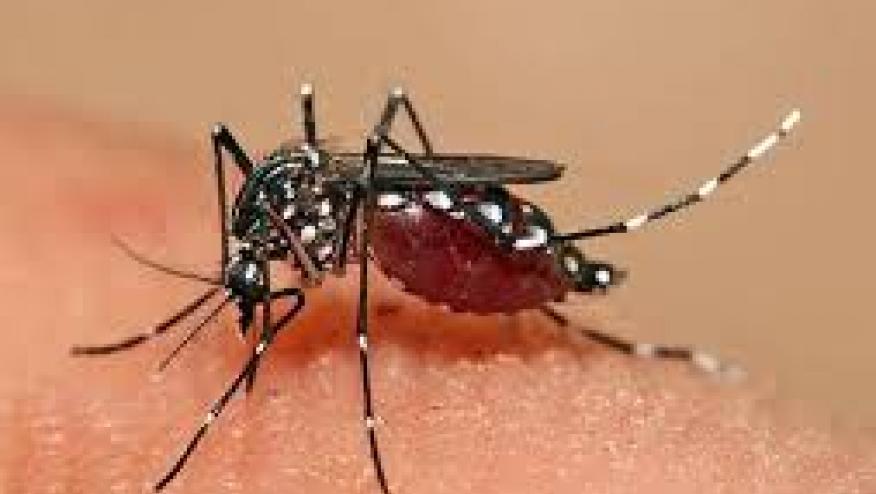Methotrexate May Help in Chronic Chikungunya Arthritis Save

Methotrexate may provide benefits in treatment of the chronic arthritis that can persist following acute chikungunya virus infection, but definitive evidence remains lacking, researchers reported.
In a systematic review that included six studies, the single (nonblinded) randomized clinical trial of methotrexate plus hydroxychloroquine and sulfasalazine found that the methotrexate combination was more effective than hydroxychloroquine monotherapy on the Disease Activity Score in 28 joints (DAS28), with scores at week 24 of 3.39 in the combination group versus 4.74 in the monotherapy group (P<0.0001), according to Robert T. Schoen, MD, of Yale University in New Haven, CT, and colleagues.
At 24 weeks, patients in the combination group also had less self-reported disability, with scores on the Health Assessment Questionnaire of 1.4 versus 1.88 (P<0.0001), the researchers reported online in Arthritis Care & Research.
Mosquito-borne chikungunya virus, first isolated in Tanzania in the 1950s, emerged in the Americas in 2013, where it has been implicated in almost three million cases through 2016. The acute phase of the viral infection is characterized by fever, headache, rash, and polyarthralgia, lasting for about 10 days. Then, in an estimated one-third to two-thirds of patients, musculoskeletal symptoms appear and can persist for months.
During the acute phase, numerous cytokines are elevated, including interleukin (IL)-6, interferon (IFN)-α, and IFN-γ, while in the chronic phase, the cytokine profile resembles that seen in rheumatoid arthritis, with elevations of IL-6, IL-7, IL-15, and IFN-α. The specific pathogenesis of chronic chikungunya arthritis remains uncertain, however. Some have hypothesized that autoimmunity plays a role, but attempts to detect the virus in synovial fluid have been unsuccessful.
The optimal treatment for both acute and chronic disease phases is unclear, with no evidence for antiviral efficacy, so treatment is supportive during the acute period.
But regarding the chronic phase, the researchers observed, "Chronic chikungunya arthritis can cause joint damage, bone erosion, and worsening of quality of life as severe as rheumatoid arthritis and related diseases." Accordingly, there has been increasing interest in the potential for disease-modifying anti-rheumatic drugs (DMARDs), particularly methotrexate, as a suitable treatment. This agent can inhibit various proinflammatory cytokines, such as IL-1, IL-6, and TNF-α, and upregulate anti-inflammatory cytokines.
"In addition, given the widespread availability and relative cost effectiveness of methotrexate and familiarity with its use among clinicians in the treatment of inflammatory arthritis patients, methotrexate may emerge as an important drug in the therapy of patients with chronic chikungunya arthritis if efficacy and safety can be demonstrated," Schoen and colleagues wrote.
To examine the evidence thus far, the researchers conducted a systematic review in which they identified one randomized trial, four retrospective studies, and one prospective study, with significant between-study differences.
In one study, which included 128 patients, four specific subtypes of arthritis were seen: reactivation of chronic musculoskeletal pain, fibromyalgia, spondyloarthropathy, and symmetric chronic joint disease. Among those with inflammatory arthritis who were treated with methotrexate, the DAS28 fell from 4.8 at baseline to 3.3 at month 5.
In another study, which included 94 patients with no prior arthritis but who had persistent inflammatory rheumatism following acute chikungunya infection, 72 patients were given methotrexate at a mean dosage of 15 mg/week, with 75% of participants showing efficacy at a median of 21 months.
Other studies were small, involving only 16 to 21 patients, and had mixed results for methotrexate monotherapy or in combination with other DMARDs.
The available data assessing the efficacy of methotrexate are "very limited," Schoen et al observed. Nonetheless, "our systematic review supports our belief that methotrexate should receive further study for the treatment of chronic chikungunya arthritis," and randomized clinical trials should be conducted in areas that are now endemic for the virus.
Until such trials are done, however, "it is not clear how these patients should be treated," Schoen told MedPage Today.
"Many patients with chikungunya fever will have resolution of joint symptoms without specific intervention or can be managed with symptomatic treatment such as NSAIDs. In some patients, however, arthritic symptoms may be more severe and last for months. Available, limited evidence suggests that methotrexate may be an option, both in terms of efficacy and lack of reported toxicity. But given the growing worldwide burden of chronic chikungunya arthritis, a careful, scientifically rigorous study of methotrexate in chronic chikungunya arthritis is needed."







If you are a health practitioner, you may Login/Register to comment.
Due to the nature of these comment forums, only health practitioners are allowed to comment at this time.